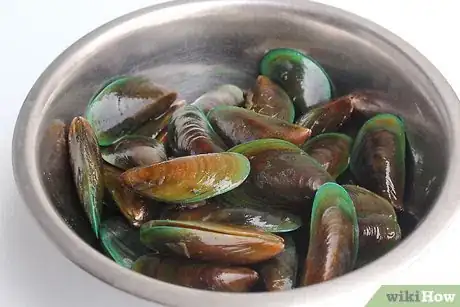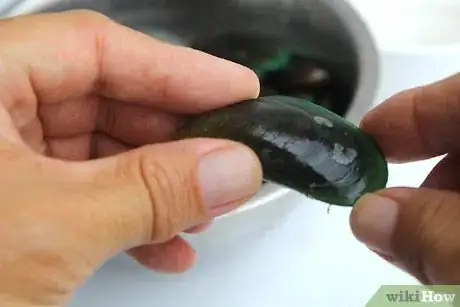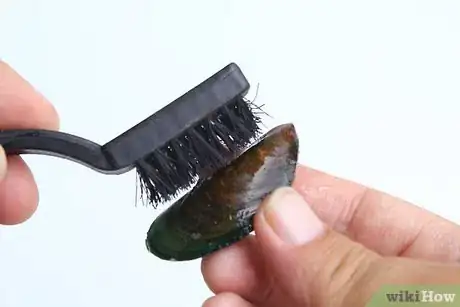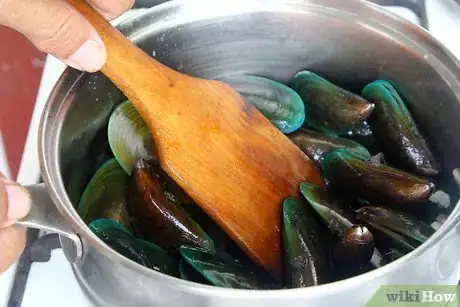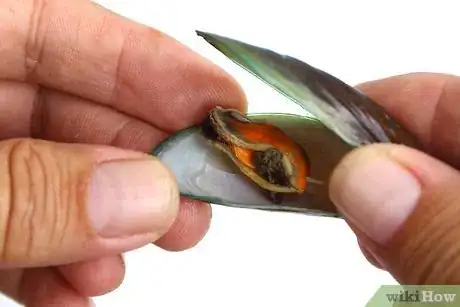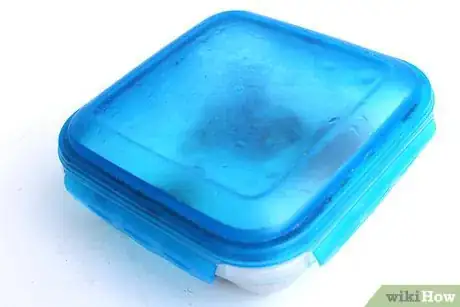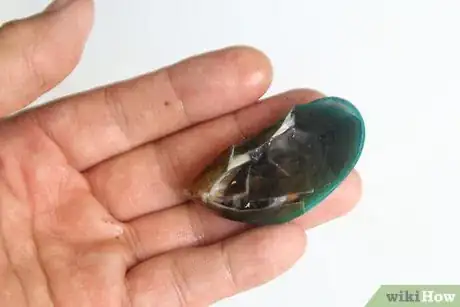This article was co-authored by wikiHow staff writer, Megaera Lorenz, PhD. Megaera Lorenz is an Egyptologist and Writer with over 20 years of experience in public education. In 2017, she graduated with her PhD in Egyptology from The University of Chicago, where she served for several years as a content advisor and program facilitator for the Oriental Institute Museum’s Public Education office. She has also developed and taught Egyptology courses at The University of Chicago and Loyola University Chicago.
There are 14 references cited in this article, which can be found at the bottom of the page.
This article has been viewed 82,743 times.
Learn more...
Fresh mussels are delicious and easy to cook. In order to keep them fresh, flavorful, and safe to eat, however, it helps to store them properly. You can store the raw mussels for a few days in your fridge or up to 3 months in your freezer. You can also freeze or refrigerate them for later use after cooking them.
Steps
Storing Live Mussels in Your Refrigerator
-
1Place the mussels in a bowl or on a tray. After bringing home your live mussels, you will need to prepare them for storage right away. Take the mussels out of the bag or container they came in and put them in a bowl or on a tray.[1] Don't worry about organizing them neatly—piling them up in the container shouldn't hurt them.
- If you prefer, you can store the mussels in a colander on top of a dish. This will allow any liquid produced by the mussels to drain off.[2]
- Don't store your mussels in a closed container or plastic bag. They need to be in an open container in order to breathe.
-
2Cover the container with a clean, damp cloth or paper towel. This will help the mussels retain moisture without smothering them. Don't add any water to the container with the mussels, as this could kill them and cause them to spoil.[3]
- You can help keep them chilled by putting a zipper-top bag of ice on top of the mussels underneath the cloth or paper towel.[4] Don't let the ice come into direct contact with the mussels, however.
Advertisement -
3Place your mussels on the bottom shelf of your refrigerator. Keep the mussels in a place where they won't be able to leak or drip on other food items in your fridge.[5] The bottom of the fridge is usually the coldest part, especially at the back, so keeping your mussels there will also help them stay well chilled.[6]
- Take care not to let your mussels get frosty, since this will kill them. The optimal storage temperature is between 39 °F (4 °C) and 46 °F (8 °C).[7]
-
4Check your mussels daily and drain off any liquid. The mussels will produce a small amount of liquid each day. If you don't keep them in a self-draining container (such as a colander), this liquid will accumulate in the container. Pour out any liquid each day to keep your mussels fresh and healthy for as long as possible.[8]
- If you store your mussels in a colander, empty the tray or dish underneath regularly to prevent a buildup of liquid that could potentially overflow and leak out into your refrigerator.
-
5Store the mussels for no more than 3 to 4 days. If your mussels were fresh when you bought them, they should stay alive for a few days if you store them properly.[9] Ideally, you should cook and eat your mussels within 2 days of bringing them home.[10]
- Throw away any mussels that have been in your fridge for longer than 4 days.
-
6Examine the mussels before cooking them to ensure they are still fresh. When you're ready to cook the mussels, check them over carefully. Look for shells that are damaged, and tap any open shells to make sure that they close. Your mussels should have a mild, salty smell, like the ocean.[11]
- Wait on cleaning and debearding your mussels until you are ready to cook them, since this process can kill the mussels.
Freezing Live Mussels
-
1Clean and debeard the mussels before freezing them. Place the mussels in a bowl of cool water and scrub them with a wire brush to remove grit and barnacles, then use scissors to snip off the “beards” (tough fibers protruding from the shell).[12]
- As you are cleaning the mussels, check for any that appear to be dead or damaged and discard them.
- Cleaning and debearding your mussels will likely kill them, so don't do this until you are ready to put the mussels in the freezer.
-
2Freeze the mussels in a freezer-safe bag or container. Select a heavy-duty freezer bag or other freezer-friendly container and place the mussels inside however you like. You don't need to worry about spreading them out or arranging them neatly. Squeeze as much air as you can out of the bag or container and put it in your freezer.[13]
- Mark the date on your bag or container with a permanent marker so that you know how long the mussels have been frozen before you use them.
-
3Use the mussels within 3 months after freezing. If you maintain your frozen mussels at 0 °F (−18 °C), they should stay fresh and safe to eat for up to 3 months. After that, the quality and flavor of the mussels will begin to decline, but they should still be safe to eat if you store them properly and keep them at a constant temperature.[14]
- Mussels that have been frozen for more than a few months may become mushy when cooked.
-
4Cook frozen mussels within 2 days after thawing them. Once you're ready to eat the mussels, you can thaw them in the refrigerator overnight. Another option is to place them in a bowl of cold water for about 1 hour.[15] After thawing, you can safely keep the mussels in your refrigerator for up to 2 days before cooking and eating them.[16]
- Don't refreeze your mussels after thawing them. This will significantly reduce their quality and may create a risk of bacterial contamination.
Preserving Cooked Mussels in the Freezer
-
1Remove the mussels from their shells. After the mussels are cooked, set aside any that you wish to freeze. Carefully pry open the shells and remove the meat.[17] You can remove the meat with a spoon or knife—it should come out easily if the mussels are properly cooked.
- If you've just cooked the mussels, wait until they cool down before removing the shells. Otherwise, they may be too hot to handle comfortably.
- If any mussels are still closed after cooking, you can slide a knife between the 2 halves of the shell and gently pry them apart.
- Despite rumors to the contrary, it's safe to eat mussels that are still closed after cooking—as long as they were fresh before you cooked them![18]
-
2Place the mussels in a leak-proof, freezer-safe container. Select a sturdy container with a lid that closes tightly.[19] A freezer bag is another option, but make sure to choose one that locks tightly and can hold both the mussels and their broth without leaking.
- Arrange the mussels however you like in the container. You just need to spread them out enough that the cooking broth can cover them.
-
3Cover the mussels in the broth you used to cook them. After placing the mussels in the container, pour in enough of the liquid produced during the cooking process to cover them.[20] This will help preserve the flavor of the mussels.
- To avoid scalding yourself, give the broth a chance to cool down before pouring it into the container.
-
4Store the sealed container in your freezer for up to 4 months. Once you've poured in the broth, close the lid tightly, or zip the top if you used a bag. Write the date on the container or bag with a permanent marker. Your cooked mussels should maintain their quality for up to 4 months.[21]
- After 4 months, your mussels may become a bit mushy or lose some of their flavor.
Keeping Cooked Mussels in the Refrigerator
-
1Place the cooked mussels in a container. Cooked mussels will keep best in a sealed container.[22] Select a container with a lid that closes tightly, or put your cooked mussels in a zipper-top bag. If you wish, you can place the cooking broth in the container with the mussels.
-
2Store your mussels in the refrigerator for no more than 4 days. Once cooked, your mussels should stay fresh in the refrigerator for 1-4 days.[23] Throw away any mussels that are left over after 4 days have passed.
- Before eating any cooked mussels, check for an unpleasant odor or a slimy texture. These are signs that the mussel has gone bad, and should not be eaten.[24]
-
3Keep the cooked mussels separate from any uncooked shellfish. Avoid contaminating your cooked mussels with bacteria and dirt by storing them away from uncooked mussels and other shellfish. Always wash your hands and utensils with warm water and soap after handling uncooked shellfish.[25]
Community Q&A
-
QuestionHow long can you keep fresh mussels in the fridge?
 Drew Hawkins1Community AnswerIf you store them right, you can keep mussels in your fridge for 3-4 days. Put the live mussels in a bowl or on a tray. Don't keep them in a closed container or a sealed plastic bag. They need to be in an open container in order to breathe. Cover the container with a damp cloth or paper towel to help them retain moisture without smothering them. Don't add extra water to the container or you could kill them. If you want to keep them chilled, you can put a zipper-top bag of ice on top of the mussels underneath the cloth or paper towel. Keep the mussels in a place where they won't be able to leak or drip on other food items in your fridge such as the bottom shelf, which is usually the coldest part. You can keep them there for up to 4 days, but pour out any liquid each day to keep your mussels fresh and healthy for as long as possible.
Drew Hawkins1Community AnswerIf you store them right, you can keep mussels in your fridge for 3-4 days. Put the live mussels in a bowl or on a tray. Don't keep them in a closed container or a sealed plastic bag. They need to be in an open container in order to breathe. Cover the container with a damp cloth or paper towel to help them retain moisture without smothering them. Don't add extra water to the container or you could kill them. If you want to keep them chilled, you can put a zipper-top bag of ice on top of the mussels underneath the cloth or paper towel. Keep the mussels in a place where they won't be able to leak or drip on other food items in your fridge such as the bottom shelf, which is usually the coldest part. You can keep them there for up to 4 days, but pour out any liquid each day to keep your mussels fresh and healthy for as long as possible. -
QuestionHow long can mussels live in a plastic bag?
 Drew Hawkins1Community AnswerNever, I repeat, never store live mussels in a plastic bag unless you plan to freeze them. The sealed environment could suffocate and kill them, which can cause them to spoil much more quickly. If you're trying to store the mussels for a few days, use an open container or a tray. Place your mussels in it and cover it with a damp cloth or paper towel so they stay moist but don't smother. You can keep the container in you fridge for 3-4 days. Place them on the bottom shelf, which is the coldest and least likely to be disturbed.
Drew Hawkins1Community AnswerNever, I repeat, never store live mussels in a plastic bag unless you plan to freeze them. The sealed environment could suffocate and kill them, which can cause them to spoil much more quickly. If you're trying to store the mussels for a few days, use an open container or a tray. Place your mussels in it and cover it with a damp cloth or paper towel so they stay moist but don't smother. You can keep the container in you fridge for 3-4 days. Place them on the bottom shelf, which is the coldest and least likely to be disturbed. -
QuestionWhat happens if you eat a dead mussel?
 Drew Hawkins1Community AnswerAnytime you cook mussels, whether you boil them, steam them, sauté them, or fry them, they'll be killed. However, you always want to start with fresh, live mussels. As soon as mussels die, their meat starts to quickly deteriorate and the likelihood of them being contaminated with bacteria and microorganisms goes way up. You could get seriously ill if you eat spoiled mussels. Your safest bet is to stick to live, healthy mussels. If you're unsure, don't risk it!
Drew Hawkins1Community AnswerAnytime you cook mussels, whether you boil them, steam them, sauté them, or fry them, they'll be killed. However, you always want to start with fresh, live mussels. As soon as mussels die, their meat starts to quickly deteriorate and the likelihood of them being contaminated with bacteria and microorganisms goes way up. You could get seriously ill if you eat spoiled mussels. Your safest bet is to stick to live, healthy mussels. If you're unsure, don't risk it!
Warnings
- It is never safe to eat mussels that were dead before cooking or freezing. Tap on any open mussels to make sure that they close, and discard any that don't. Throw away any mussels with dry or damaged shells, as well as those that have an unpleasant odor.[26]⧼thumbs_response⧽
Things You'll Need
- Bowl, tray, or colander
- Damp paper towel or cloth
- Mussels
- Freezer-safe container
References
- ↑ http://chefmichaelsmith.com/video/mussels-101/
- ↑ https://www.tastingtable.com/cook/national/How-to-Clean-and-Store-Clams-Mussels-and-Oysters
- ↑ http://articles.chicagotribune.com/2006-03-15/entertainment/0603150016_1_mussels-shells-sand-or-grit
- ↑ https://www.seriouseats.com/2014/11/how-to-clean-debeard-mussels.html
- ↑ http://www.bccdc.ca/resource-gallery/Documents/Educational%20Materials/EH/FPS/Fish/ShellfishAdviceforConsumers.pdf
- ↑ https://www.sciencefocus.com/science/where-is-the-coldest-part-of-the-fridge-the-bottom-or-the-top/
- ↑ http://www.chiltern.gov.uk/media/10186/Safely-storing-oysters-clams-and-mussels/pdf/Safely_Storing_Oysters__Clams_and_Mussels.pdf
- ↑ http://chefmichaelsmith.com/video/mussels-101/
- ↑ https://www.doh.wa.gov/CommunityandEnvironment/Shellfish/RecreationalShellfish/IllnessPrevention/HandleStoreandCook
- ↑ https://www.tastingtable.com/cook/national/How-to-Clean-and-Store-Clams-Mussels-and-Oysters
- ↑ http://chefmichaelsmith.com/video/mussels-101/
- ↑ https://www.canyoufreezethis.com/can-freeze-mussels/
- ↑ https://www.canyoufreezethis.com/can-freeze-mussels/
- ↑ https://www.stilltasty.com/fooditems/index/17758
- ↑ http://www.bccdc.ca/resource-gallery/Documents/Educational%20Materials/EH/FPS/Fish/ShellfishAdviceforConsumers.pdf
- ↑ https://www.doh.wa.gov/CommunityandEnvironment/Shellfish/RecreationalShellfish/IllnessPrevention/HandleStoreandCook
- ↑ https://www.canyoufreezethis.com/can-freeze-mussels/
- ↑ http://www.abc.net.au/science/articles/2008/10/29/2404364.htm
- ↑ https://www.canyoufreezethis.com/can-freeze-mussels/
- ↑ http://www.issc.org/mussels
- ↑ https://www.stilltasty.com/fooditems/index/17758
- ↑ http://www.bccdc.ca/resource-gallery/Documents/Educational%20Materials/EH/FPS/Fish/ShellfishAdviceforConsumers.pdf
- ↑ http://www.bccdc.ca/resource-gallery/Documents/Educational%20Materials/EH/FPS/Fish/ShellfishAdviceforConsumers.pdf
- ↑ https://www.stilltasty.com/fooditems/index/17757
- ↑ http://www.issc.org/mussels
- ↑ https://www.bbcgoodfood.com/videos/techniques/how-cook-mussels
